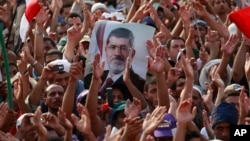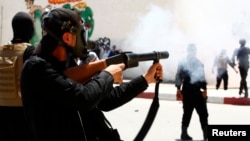BEIRUT —
The ouster of the Muslim Brotherhood’s Mohamed Morsi as president of Egypt has sharpened political divisions throughout the Arab Spring nations of the Middle East and North Africa.
The division is between those who align with Islamists and argue that Morsi’s overthrow was a military coup, and supporters of more secular parties who believed Morsi was an autocrat and watched in frustration as the clout of political Islam grew steadily since the Arab Spring uprisings began two-and-a-half years ago.
Some liberals and secularists, however, worry that the overthrow of Morsi, an elected leader, could backfire and bring about an end to the fledgling democratic experiment in the region’s most populous nation.
In Tunisia, where the Arab Spring uprisings started with the ouster of Zine al-Abidine Ben Ali, liberal protesters celebrated outside the Egyptian Embassy chanting “Today Egypt, Tunisia tomorrow.” Young Tunisian liberals drew inspiration from Egypt and launched their own Tamarod (rebellion) campaign, modeling it on the movement Egyptians used to rally millions of anti-Morsi protesters in the streets of Cairo and other cities last week.
Tunisian movement calls on government to resign
They called for the resignation of the Tunisian government led by the Islamist Ennahdha party, which had condemned Morsi’s ouster. They also called for the National Constituent Assembly to be dissolved and early presidential elections. The Tunisian movement’s leader, Mohammed Bannour, claims a Tamarod petition there has gathered more than 180,000 signatures in two weeks.
This has drawn a stern warning from the Leagues for the Protection of the Revolution (LPR) in Tunisia, a conservative Salafist group that has been accused of using violence to intimidate opponents.
“We have yet to organize protests in support of a legitimate power in Tunisia, but we have contacts of people in every governorate,” said the League's chief, Mounir Achour. “We are ready to resort to violence if necessary.”
For Achour, Morsi’s ouster was neither legitimate nor a revolution, but simply a coup. “I am really upset by how the Egyptians removed Morsi. That is not fair. He was doing his job perfectly and governing by the rule of law.”
In Libya, there are mutterings that it too needs a “second revolution” to fulfill the objectives of the uprising that led to the downfall of Col. Moammar Gadhafi. Suspicions are mounting about the intentions of Islamists following the passage of a political exclusion law that forced the resignation of the president of Libya's parliament.
Confrontation in Libya
On Sunday, protestors in Tripoli demonstrated against the continued existence of unofficial revolutionary brigades, many of which are influenced by political Islam, and threated to take on the militias at some time in the future.
“When we have enough people, we will go on to the headquarters of these militias,” said one of the protest organizers.
The protest coincided with the first anniversary of the election of Libya’s parliament, the nation’s first free election in almost half a century. But there was no sense of celebration, just frustration with a parliament that has made little progress because of deep political divisions and a lack of willingness to make compromises, according to Libyan journalist Umar Khan.
Fighting has flared in Tripoli and Benghazi in recent weeks, roiling the already unruly regional and tribal politics in the area. Islamists, concerned about the turn of events in Egypt, are reportedly beefing up their militias even though there is no army to speak of capable of mounting a coup.
A setback for democracy?
Traditionally, countries across the region have looked to Egypt as a leading example in religion, politics and culture. For Islamists, Egypt is the birthplace of Sunni political Islam, the place where the Muslim Brotherhood was founded in 1928. For them, Morsi's fall was a strategic setback -- not just for the Muslim Brotherhood in Egypt, but also for similar groups farther afield.
In a statement, al-Jamaa al-Islamiya in Lebanon, a Sunni Islamist party, decried Morsi’s ouster, saying: “Everyone is suffering from what is happening in Egypt, the great Arab country that held a referendum on the constitution, and free elections for the [lower house of] parliament and the Shura Council and the president of the republic.”
Some analysts fear Morsi's overthrow may lead the Islamists to draw the wrong lessons and not see fault in the ousted president's overreach, his mismanagement of the economy and his failure to accommodate political opponents.
These analysts worry that Islamists, already distrustful of democracy as a Western import, will turn their back on elections and explore violent ways to win governing power. It was a point made last week by Morsi aide Essam Haddad, who tweeted as even the army intervened, this “message will resonate throughout the Muslim world loud and clear: Democracy is not for Muslims.”
That conviction was echoed by al-Qaida's Islamic State of Iraq and Syria.
“[We] always knew that our rights can only be regained by force and that is why we have chosen the ammunition box instead of the ballot box," the militant group said on the day Morsi fell.
The division is between those who align with Islamists and argue that Morsi’s overthrow was a military coup, and supporters of more secular parties who believed Morsi was an autocrat and watched in frustration as the clout of political Islam grew steadily since the Arab Spring uprisings began two-and-a-half years ago.
Some liberals and secularists, however, worry that the overthrow of Morsi, an elected leader, could backfire and bring about an end to the fledgling democratic experiment in the region’s most populous nation.
In Tunisia, where the Arab Spring uprisings started with the ouster of Zine al-Abidine Ben Ali, liberal protesters celebrated outside the Egyptian Embassy chanting “Today Egypt, Tunisia tomorrow.” Young Tunisian liberals drew inspiration from Egypt and launched their own Tamarod (rebellion) campaign, modeling it on the movement Egyptians used to rally millions of anti-Morsi protesters in the streets of Cairo and other cities last week.
Tunisian movement calls on government to resign
They called for the resignation of the Tunisian government led by the Islamist Ennahdha party, which had condemned Morsi’s ouster. They also called for the National Constituent Assembly to be dissolved and early presidential elections. The Tunisian movement’s leader, Mohammed Bannour, claims a Tamarod petition there has gathered more than 180,000 signatures in two weeks.
This has drawn a stern warning from the Leagues for the Protection of the Revolution (LPR) in Tunisia, a conservative Salafist group that has been accused of using violence to intimidate opponents.
“We have yet to organize protests in support of a legitimate power in Tunisia, but we have contacts of people in every governorate,” said the League's chief, Mounir Achour. “We are ready to resort to violence if necessary.”
For Achour, Morsi’s ouster was neither legitimate nor a revolution, but simply a coup. “I am really upset by how the Egyptians removed Morsi. That is not fair. He was doing his job perfectly and governing by the rule of law.”
In Libya, there are mutterings that it too needs a “second revolution” to fulfill the objectives of the uprising that led to the downfall of Col. Moammar Gadhafi. Suspicions are mounting about the intentions of Islamists following the passage of a political exclusion law that forced the resignation of the president of Libya's parliament.
Confrontation in Libya
On Sunday, protestors in Tripoli demonstrated against the continued existence of unofficial revolutionary brigades, many of which are influenced by political Islam, and threated to take on the militias at some time in the future.
“When we have enough people, we will go on to the headquarters of these militias,” said one of the protest organizers.
The protest coincided with the first anniversary of the election of Libya’s parliament, the nation’s first free election in almost half a century. But there was no sense of celebration, just frustration with a parliament that has made little progress because of deep political divisions and a lack of willingness to make compromises, according to Libyan journalist Umar Khan.
Fighting has flared in Tripoli and Benghazi in recent weeks, roiling the already unruly regional and tribal politics in the area. Islamists, concerned about the turn of events in Egypt, are reportedly beefing up their militias even though there is no army to speak of capable of mounting a coup.
A setback for democracy?
Traditionally, countries across the region have looked to Egypt as a leading example in religion, politics and culture. For Islamists, Egypt is the birthplace of Sunni political Islam, the place where the Muslim Brotherhood was founded in 1928. For them, Morsi's fall was a strategic setback -- not just for the Muslim Brotherhood in Egypt, but also for similar groups farther afield.
In a statement, al-Jamaa al-Islamiya in Lebanon, a Sunni Islamist party, decried Morsi’s ouster, saying: “Everyone is suffering from what is happening in Egypt, the great Arab country that held a referendum on the constitution, and free elections for the [lower house of] parliament and the Shura Council and the president of the republic.”
Some analysts fear Morsi's overthrow may lead the Islamists to draw the wrong lessons and not see fault in the ousted president's overreach, his mismanagement of the economy and his failure to accommodate political opponents.
These analysts worry that Islamists, already distrustful of democracy as a Western import, will turn their back on elections and explore violent ways to win governing power. It was a point made last week by Morsi aide Essam Haddad, who tweeted as even the army intervened, this “message will resonate throughout the Muslim world loud and clear: Democracy is not for Muslims.”
That conviction was echoed by al-Qaida's Islamic State of Iraq and Syria.
“[We] always knew that our rights can only be regained by force and that is why we have chosen the ammunition box instead of the ballot box," the militant group said on the day Morsi fell.





